 There are some years when it just seems like the holidays get ahead of you and you find yourself playing catch-up all the way to Christmas. This has been one of those years…with a little bit of a twist. This year, Thanksgiving fell very late in the month…November 28th. Of course, Thanksgiving is always the fourth Thursday in November, so that means that the earliest it can be in the 22nd and the latest is the 28th. So, this year it was the 28th, and for some reason, it felt like Thanksgiving would never arrive. I kept thinking that it should have been here two weeks earlier. Then, when it finally arrived, it felt like Christmas was…tomorrow!! Suddenly, it hit me that I had a lot to do to get ready for Christmas. It felt like all the shopping days were coming to an end, and I wasn’t even remotely ready. I felt like I was going to panic.
There are some years when it just seems like the holidays get ahead of you and you find yourself playing catch-up all the way to Christmas. This has been one of those years…with a little bit of a twist. This year, Thanksgiving fell very late in the month…November 28th. Of course, Thanksgiving is always the fourth Thursday in November, so that means that the earliest it can be in the 22nd and the latest is the 28th. So, this year it was the 28th, and for some reason, it felt like Thanksgiving would never arrive. I kept thinking that it should have been here two weeks earlier. Then, when it finally arrived, it felt like Christmas was…tomorrow!! Suddenly, it hit me that I had a lot to do to get ready for Christmas. It felt like all the shopping days were coming to an end, and I wasn’t even remotely ready. I felt like I was going to panic.
Then, there were the upcoming parties and decorating the house, planning the upcoming party meals, timing for gatherings, and well, lots more. It is the season for all the hustle and bustle, the shopping, and all the makings of the Christmas season. Whether we are preparing for the celebrations, shopping, or cooking, this is the busiest season of the year. That can mean lots of stress, and that can be difficult to manage. Of course, when the day finally arrives, and Christmas is finally here, we always seem to be able to set all that anxiety aside and enjoy the time with our loving families…at least once dinner is on the table.
I’m not sure why this year hit me that way, but I don’t think I’m alone in it. I know several people who have  put their Christmas decorations up later than normal, unless they are like my granddaughter, Shai Royce, who had her tree and decorations up before Halloween. I don’t know how she does it. I was in no way prepared then. Then when I did get ready, we had an “epic fail” when the tree was up and we put the lights on and only one string worked. We had been planning to buy a new pre-lit tree for next year, but we couldn’t see buying a string of lights we wouldn’t need next year. So, we bought a new tree…and no, the tree isn’t completely decorated yet. I’m still running very behind on things this year, but whether we are behind or not, Christmas will arrive, right on time, December 25th. One way or the other, ’tis the season, and we will participate.
put their Christmas decorations up later than normal, unless they are like my granddaughter, Shai Royce, who had her tree and decorations up before Halloween. I don’t know how she does it. I was in no way prepared then. Then when I did get ready, we had an “epic fail” when the tree was up and we put the lights on and only one string worked. We had been planning to buy a new pre-lit tree for next year, but we couldn’t see buying a string of lights we wouldn’t need next year. So, we bought a new tree…and no, the tree isn’t completely decorated yet. I’m still running very behind on things this year, but whether we are behind or not, Christmas will arrive, right on time, December 25th. One way or the other, ’tis the season, and we will participate.
 Sometimes, people are so serious about their cause, that they decide to stage a sit-in. Sometimes that, in itself, can become extreme. Such was the case when four students at the University of California, Berkeley, decided to occupy the treetops of an oak grove on campus on December 2, 2006. They were there to show their opposition to the university’s intention to clear more than an acre of forest for a new athletic center, sparking an epic 21-month standoff. This event marked one of the longest tree sit-ins in historical record. When I read that they were there that long, I was stunned. To give up almost 2 years of one’s life for a protest…unbelievable.
Sometimes, people are so serious about their cause, that they decide to stage a sit-in. Sometimes that, in itself, can become extreme. Such was the case when four students at the University of California, Berkeley, decided to occupy the treetops of an oak grove on campus on December 2, 2006. They were there to show their opposition to the university’s intention to clear more than an acre of forest for a new athletic center, sparking an epic 21-month standoff. This event marked one of the longest tree sit-ins in historical record. When I read that they were there that long, I was stunned. To give up almost 2 years of one’s life for a protest…unbelievable.
I understand the desire to save trees, but I guess, I can’t understand fighting such a losing battle. Tree sit-ins are “a method of civil disobedience” where protesters physically inhabit a tree to protect it from being felled, sometimes remaining there for extended durations. During the height of the Berkeley protest, more than twelve individuals resided among the branches of the grove’s oak and redwood trees, with volunteers and supporters providing them with food, water, and other necessities. This was not just civil disobedience, but it  was assisted by more than a dozen people, to make sure that no one could cut down those trees, and they were the property of the university.
was assisted by more than a dozen people, to make sure that no one could cut down those trees, and they were the property of the university.
Of course, it wasn’t just the students either. They also had the backing of the Sierra Club and the California Native Plant Society, as well as facing lawsuits from three entities, including the Berkeley City Council, due to the project’s closeness to the hazardous Hayward Fault. A conservation analyst noted that the grove served as a habitat for over 300 animal species, such as deer, squirrels, woodpeckers, and moths. There were a number of “logical” reasons why the grove should be spared, but the fact remains that the animals would find another place to live, and they weren’t taking all the trees. I don’t mean to sound cold, and I’m as willing as the next guy to fight for things I believe in, but this made no sense…not to me anyway.
 Nevertheless, the students held their ground until 2007, when an Alameda County judge issued an injunction that halted the plans to cut down a grove. It was a temporary “stay of execution” for the trees, but by July 2008, the court decided in favor of the university. Once the decision was made, campus police arrested protesters and dismantled their redwood encampments. There was an appeal, of course, to a state appeals court in September 2008, but they declined to halt construction, permitting the university to remove the entire grove within the next three days. A week later, the last four tree-sitters descended from one of the final two redwoods near the stadium and were arrested. The students had wasted 649 days of their lives, on a battle they couldn’t win. I guess hope springs eternal.
Nevertheless, the students held their ground until 2007, when an Alameda County judge issued an injunction that halted the plans to cut down a grove. It was a temporary “stay of execution” for the trees, but by July 2008, the court decided in favor of the university. Once the decision was made, campus police arrested protesters and dismantled their redwood encampments. There was an appeal, of course, to a state appeals court in September 2008, but they declined to halt construction, permitting the university to remove the entire grove within the next three days. A week later, the last four tree-sitters descended from one of the final two redwoods near the stadium and were arrested. The students had wasted 649 days of their lives, on a battle they couldn’t win. I guess hope springs eternal.

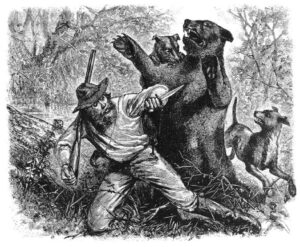 Being in the fur trade, especially back in the 1800s was no picnic. While the trapper was the one with the traps and the guns, that doesn’t mean that the wild animals couldn’t get the better of them from time to time. In addition, the hardships endured by even the most resilient of trappers, such as being alone in the wilderness and in constant danger of conflict with both wild animals and men, are beyond our ability to comprehend. Most perished in the quiet of remote areas, their names now lost, the valor of their final struggles unrecorded. Only the archives of the major fur companies offer scant references to such events deemed significant enough to document.
Being in the fur trade, especially back in the 1800s was no picnic. While the trapper was the one with the traps and the guns, that doesn’t mean that the wild animals couldn’t get the better of them from time to time. In addition, the hardships endured by even the most resilient of trappers, such as being alone in the wilderness and in constant danger of conflict with both wild animals and men, are beyond our ability to comprehend. Most perished in the quiet of remote areas, their names now lost, the valor of their final struggles unrecorded. Only the archives of the major fur companies offer scant references to such events deemed significant enough to document.
These events typically took place in the great mountains, where trappers held rendezvous and spent the majority of their lives. The catastrophic Battle of Pierre’s Hole, the valiant exploration of Utah, and the initial advance into California are all laden with dramatic episodes. However, these incidents occurred too far to the west to be included in the scope of this current work.
In the initial years of exploration, with beaver trapping along the streams, the Great Plains served primarily as a thoroughfare from civilized regions to the more lucrative mountainous areas beyond. Travelers, whether alone or in groups, journeyed up the Missouri River by boat or trekked along the Platte River valley on foot, aiming for the distant mountain ranges. Undoubtedly, they experienced considerable hardship, adventure, and conflicts with Native Americans along those extensive prairie stretches, yet these events were deemed too mundane to merit inclusion in the fur companies’ matter-of-fact records.
One man had a harrowing experience, and somehow it was deemed important to make it into the annals of history. The remarkable survival of Hugh Glass is a testament to the resilience and fortitude of these frontiersmen. Glass was part of Andrew Henry’s group on an expedition to the Yellowstone River. While hunting near the Grand River, a grizzly bear charged from the brush, knocked him down, ripped a chunk of flesh from him, and fed it to her cubs. Glass attempted to flee, but the bear quickly attacked again, biting his shoulder and causing severe injuries to his hands and arms. At that moment, his fellow hunters arrived and killed the bear. Glass was grievously injured and barely alive. He was not expected to live. In the hostile territory of the Native Americans, the group had to move on swiftly. Eventually, Major Henry persuaded two men to stay with Glass by offering a reward, while the rest continued on. The two were John S Fitzgerald and a man named “Bridges,” who some say was a young James “Jim” Bridger, the same Jim Bridger who would become a renowned trapper. That has not been confirmed. They stayed with Glass for five days, but losing hope in his recovery and seeing no signs of imminent death, they departed, taking his rifle and gear. Upon rejoining their group, they reported Glass as deceased.
Yet, Glass was still alive. Regaining consciousness, he dragged himself to a nearby spring. There, he found wild cherries and buffalo berries, which sustained him as he gradually regained his strength. Eventually, he embarked on a solitary trek to his destination, Fort Kiowa, on the Missouri River, 100 miles distant. He began his journey with barely enough strength to move, without provisions or any means to obtain them, in a land where any wandering Indian could easily overpower him. However, his will to live and a burgeoning desire for vengeance against those who had abandoned him spurred him on. Luck appeared to be on his side. He stumbled upon wolves attacking a buffalo calf. After the wolves had killed it, he scared them off and took the meat, consuming it as best as he could without a knife or fire. Carrying as much as possible, he continued determinedly and, despite immense suffering and difficulties, ultimately arrived at Fort Kiowa, located in what is now South Dakota.
Glass returned to the field before his wounds had fully healed. Heading east with a group of trappers along the Missouri River, they approached the Mandan villages, and he chose to traverse a bend in the river on foot. That turned out to be a wise move when Arikara Indians attacked the boats, killing everyone aboard. Glass, who was too weak to fight, narrowly escaped and was rescued by friendly Mandan Indians who took him to Tilton’s Fort. Driven by a desire for revenge against the two who had abandoned him in the mountains, he left Tilton’s that very night. So, Glass set out, braving the wilderness alone. He traveled for 38 days through territory hostile with Indian tribes, until he arrived at Fort Henry near the confluence of the Big Horn River in what is now Montana. There, he learned that the men he was after had headed east. Undeterred, he seized an opportunity to deliver a dispatch to Fort Atkinson, Nebraska.
Then, after completely healing from his injuries, Glass resumed his quest to locate Fitzgerald and “Bridges.” He made his way to Fort Henry on the Yellowstone River, only to discover it abandoned. A left-behind note revealed that Andrew Henry and his group had moved to a new encampment at the Bighorn River’s mouth. Upon reaching this location, Glass encountered “Bridges” and seemingly pardoned him due to his young age, before rejoining Ashley’s company.
Glass eventually discovered that Fitzgerald had enlisted in the army and was posted at Fort Atkinson, now in Nebraska. Glass chose to spare Fitzgerald’s life, knowing that the army captain would execute him for murdering a fellow soldier. Nevertheless, the captain demanded Fitzgerald return the rifle he had taken from Glass. Upon returning it, Glass cautioned Fitzgerald to never desert the army, or he would face death at Glass’s hands. A later account by Glass’s companion, George C Yount, which wasn’t published until 1923, revealed that Glass received $300 in restitution. I’m sure Fitzgerald felt he got off easy and had no plans to leave the army.

 In early 1833, Glass, along with fellow trappers Edward Rose and Hilain Menard, was killed on the Yellowstone River during an Arikara attack. A monument honoring Glass stands near the location of his mauling on the southern bank of what is now Shadehill Reservoir in Perkins County, South Dakota, at the confluence of the Grand River. The adjacent Hugh Glass Lakeside Use Area also offers a state-maintained campground and picnic site at no cost.
In early 1833, Glass, along with fellow trappers Edward Rose and Hilain Menard, was killed on the Yellowstone River during an Arikara attack. A monument honoring Glass stands near the location of his mauling on the southern bank of what is now Shadehill Reservoir in Perkins County, South Dakota, at the confluence of the Grand River. The adjacent Hugh Glass Lakeside Use Area also offers a state-maintained campground and picnic site at no cost.

 When my Aunt Sandy Pattan and I go to lunch, she will usually forego vegetables for a double portion of mashed potatoes. Her request will usually accompany her asking me if I know that she is Irish, and so the love of potatoes. Of course, I know that she is Irish, because she is my aunt, and I know about my own Irish ties through her side of the family. Nevertheless, I can’t say that I connected the Irish part with potatoes. So, I decided to do a little research to find our why “the Irish like potatoes” as my aunt says. In my research, I found probably the last thing I expected.
When my Aunt Sandy Pattan and I go to lunch, she will usually forego vegetables for a double portion of mashed potatoes. Her request will usually accompany her asking me if I know that she is Irish, and so the love of potatoes. Of course, I know that she is Irish, because she is my aunt, and I know about my own Irish ties through her side of the family. Nevertheless, I can’t say that I connected the Irish part with potatoes. So, I decided to do a little research to find our why “the Irish like potatoes” as my aunt says. In my research, I found probably the last thing I expected.
In the annals of Irish history, the potato transcends its role as a staple food; it embodies both prosperity and hardship. It was instrumental in supporting the population during times of expansion, yet it also played a pivotal role in one of Ireland’s most catastrophic episodes: the Great Famine. The story of the potato in Ireland  is a tale of how a single crop can influence the fate of a nation, weaving itself into the very fabric of the Irish cultural identity.
is a tale of how a single crop can influence the fate of a nation, weaving itself into the very fabric of the Irish cultural identity.
Few events in Irish history are as dark and devastating as the Great Hunger, also known as the Potato Famine. At that time, Ireland was a colony of Great Britain, which relied heavily on the country for potato production. However, in 1845, a devastating disease destroyed 75% of the potato crop, persisting for over five years. The local Irish population suffered the most. Estimates suggest that approximately one million Irish people died of starvation during the famine and another million emigrated. By the end of the famine in 1852, Ireland’s population had decreased by 25%. The British government faced criticism for its inadequate response, and the catastrophe fueled the drive for Irish independence. The Irish people felt that the British had not tried hard enough to take care of the people under their rule.
As often happens when a food item is no longer allowed or readily available, the Irish people loved their potatoes. The significance of the potato in Irish culture surpasses its agricultural importance, profoundly influencing culinary customs. It turned into a dietary mainstay, with creations like colcannon (mashed potatoes with kale or cabbage), boxty (potato pancakes) being a beloved dish in my Grandma Byer’s (Aunt Sandy’s mom) home, and Irish stew (potatoes, meat, and vegetables) becoming indispensable. These dishes were not 
 merely nourishing but also reflected the creativity and adaptability of Irish cooks who produced a variety of meals from a few ingredients. The simple yet hearty character of these potato-centric dishes mirrored the lives and struggles of ordinary people, ingraining these recipes in the heart of Irish cooking traditions. And with that, I feel like I now understand my aunt’s obsession with potatoes.
merely nourishing but also reflected the creativity and adaptability of Irish cooks who produced a variety of meals from a few ingredients. The simple yet hearty character of these potato-centric dishes mirrored the lives and struggles of ordinary people, ingraining these recipes in the heart of Irish cooking traditions. And with that, I feel like I now understand my aunt’s obsession with potatoes.

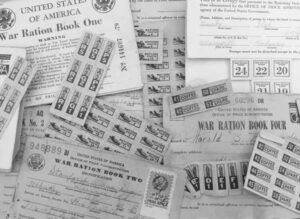 War usually brings with it, shortages and rationing. On November 29, 1942, coffee was added to the list of rationed items in the United States. Now, people can live without some things, but I would think that coffee would be a really hard item to add to that list. The coffee production in Latin America was at a record, but it made no difference, the increasing demand from military and civilian sectors, along with the pressing needs of shipping for other wartime efforts, necessitated the restriction of its availability.
War usually brings with it, shortages and rationing. On November 29, 1942, coffee was added to the list of rationed items in the United States. Now, people can live without some things, but I would think that coffee would be a really hard item to add to that list. The coffee production in Latin America was at a record, but it made no difference, the increasing demand from military and civilian sectors, along with the pressing needs of shipping for other wartime efforts, necessitated the restriction of its availability.
The truth is that scarcity or shortages were seldom the cause of rationing during the war. Rationing was typically implemented for two main reasons…to ensure an equitable distribution of resources and food to all citizens and to prioritize military needs for certain raw materials in light of the current emergency.
At first, the restriction on the use of certain items was voluntary. People were simply asked to cut back. The problem is that voluntary cutting back seldom works. Also, President Roosevelt initiated “scrap drives” to collect discarded rubber items like old garden hoses, tires, and bathing caps, especially after Japan seized the Dutch East Indies, a key rubber supplier for the United States. These collected items could be exchanged at gas stations for a penny per pound. In the early stages of the war, patriotism and the eagerness to support the war effort was enough.
As US shipping, including oil tankers, became increasingly susceptible to German U-boat attacks, gasoline was the first commodity to be rationed. In seventeen eastern states, car owners were limited to three gallons of gasoline weekly beginning in May 1942. By year’s end, rationing had expanded nationwide, with drivers required to affix ration stamps to their car windshields. Things like butter, were reserved for military use, and so were also rationed. Also limited were coffee, sugar, and milk. In fact, approximately one-third of all food typically consumed by civilians was rationed during the war at some point. We had to make sure our troops had what they needed. They were fighting for our freedom, and we would sacrifice so they could have 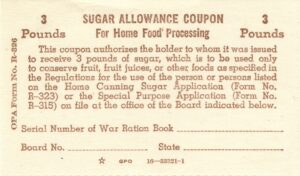
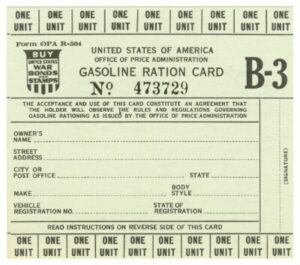 what they needed. The American people were determined and willing. Of course, that didn’t stop the black market from becoming a source for rationed items, selling goods at prices above those set by the Office of Price Administration to Americans who could afford the marked-up costs. Nevertheless, certain items were removed from the rationing list ahead of time; coffee became available in July 1943, but sugar remained rationed until June 1947.
what they needed. The American people were determined and willing. Of course, that didn’t stop the black market from becoming a source for rationed items, selling goods at prices above those set by the Office of Price Administration to Americans who could afford the marked-up costs. Nevertheless, certain items were removed from the rationing list ahead of time; coffee became available in July 1943, but sugar remained rationed until June 1947.

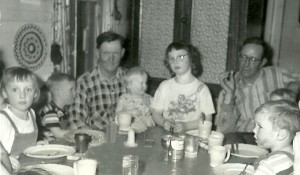 Thanksgiving Day is a time-honored tradition where we reflect on our lives and express gratitude for the blessings we’ve received throughout the year and in years gone by. We take inventory of all the aspects of our lives. The sorrowful aspects are momentarily put aside for another time, allowing us to concentrate on our family, friends, and homes. We also look forward to the future and its potential blessings. It’s not merely about material possessions; in fact, such things often take a backseat in our thoughts. Our attention is much more on the people we love. My family has been blessed with a number of new babies this year, and babies are always one of our best reasons to be thankful. We received a wonderful miracle, as the lives of two of our nephews were spared in a car fire. They have recovered well and are back with their family. While Thanksgiving is not the only occasion for appreciating our loved ones, it’s a perfect reminder to give thanks for everyday blessings that we might normally overlook in our daily lives.
Thanksgiving Day is a time-honored tradition where we reflect on our lives and express gratitude for the blessings we’ve received throughout the year and in years gone by. We take inventory of all the aspects of our lives. The sorrowful aspects are momentarily put aside for another time, allowing us to concentrate on our family, friends, and homes. We also look forward to the future and its potential blessings. It’s not merely about material possessions; in fact, such things often take a backseat in our thoughts. Our attention is much more on the people we love. My family has been blessed with a number of new babies this year, and babies are always one of our best reasons to be thankful. We received a wonderful miracle, as the lives of two of our nephews were spared in a car fire. They have recovered well and are back with their family. While Thanksgiving is not the only occasion for appreciating our loved ones, it’s a perfect reminder to give thanks for everyday blessings that we might normally overlook in our daily lives.

 This has been a hard year for some people, including my Aunt Sandy, but the Lord has blessed her, and she has come through so many life-threatening events that it is impossible not to feel a great deal of thankfulness. Today, Aunt Sandy is stronger and healthier than ever, and she even has perfect vision, because she had cataract surgery this year. Instead of ending up in a nursing home because she was too weak to live on her own, Aunt Sandy is living on her own and thriving. She is even doing puzzles, taking care of her own home (beautifully, I might add), and doing some crafting. Today is a great day of celebration for Aunt Sandy and her family.
This has been a hard year for some people, including my Aunt Sandy, but the Lord has blessed her, and she has come through so many life-threatening events that it is impossible not to feel a great deal of thankfulness. Today, Aunt Sandy is stronger and healthier than ever, and she even has perfect vision, because she had cataract surgery this year. Instead of ending up in a nursing home because she was too weak to live on her own, Aunt Sandy is living on her own and thriving. She is even doing puzzles, taking care of her own home (beautifully, I might add), and doing some crafting. Today is a great day of celebration for Aunt Sandy and her family.
I believe most people are grateful for their blessings, yet there’s a distinction between feeling grateful and expressing gratitude. That difference lies in recognizing the source of those blessings—God. I imagine those who don’t believe in God might not feel compelled to thank Him, but my deep faith tells me that my blessings can only come from Him. God’s love is abundant, and it is He who bestows His blessings upon me. On this Thanksgiving Day, it is to Him, the Almighty God, that I offer my thanks. Like many, I might overlook the importance of thanking God as I should, but perhaps a National Day of Thanksgiving 
 provides us all a chance to pause from our hectic lives to appreciate our fortunes. On this day, let us take a moment to acknowledge God’s grace and mercy towards us and to thank Him for all He has done for us. Wishing everyone a Happy Thanksgiving, and I extend my gratitude to God for His boundless love and the blessings bestowed upon me and my family, and upon my Aunt Sandy too.
provides us all a chance to pause from our hectic lives to appreciate our fortunes. On this day, let us take a moment to acknowledge God’s grace and mercy towards us and to thank Him for all He has done for us. Wishing everyone a Happy Thanksgiving, and I extend my gratitude to God for His boundless love and the blessings bestowed upon me and my family, and upon my Aunt Sandy too.
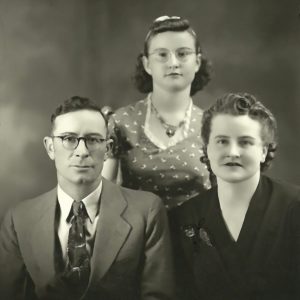
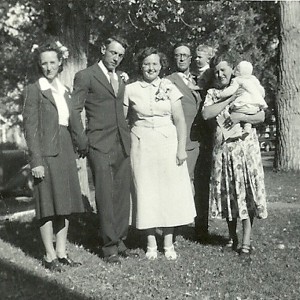 My husband, Bob Schulenberg’s grandfather, Robert Knox was mostly a quiet man. Maybe that came from his years herding sheep. For me, thinking of Grandpa’s time as a shepherd, reminded me of Jesus as the good shepherd. This image doesn’t necessarily evoke memories of my husband’s grandfather, Robert Knox, for most of our family, but it does for me. Jesus always took care of his sheep, and Grandpa always took care of his sheep and his family too. A shepherd’s primary duty is to ward off predators like coyotes, mountain lions, bears, or any other threat that could harm or kill the sheep. Historically, and perhaps even now, the shepherd is often the sole guardian of the sheep, since sheep are known to be quite docile. Predators, on the other hand, are anything but docile. Driven by hunger, they see the shepherd as the only barrier between them and their prey, placing the shepherd directly in harm’s way. That could have been the position Grandpa found himself in.
My husband, Bob Schulenberg’s grandfather, Robert Knox was mostly a quiet man. Maybe that came from his years herding sheep. For me, thinking of Grandpa’s time as a shepherd, reminded me of Jesus as the good shepherd. This image doesn’t necessarily evoke memories of my husband’s grandfather, Robert Knox, for most of our family, but it does for me. Jesus always took care of his sheep, and Grandpa always took care of his sheep and his family too. A shepherd’s primary duty is to ward off predators like coyotes, mountain lions, bears, or any other threat that could harm or kill the sheep. Historically, and perhaps even now, the shepherd is often the sole guardian of the sheep, since sheep are known to be quite docile. Predators, on the other hand, are anything but docile. Driven by hunger, they see the shepherd as the only barrier between them and their prey, placing the shepherd directly in harm’s way. That could have been the position Grandpa found himself in.
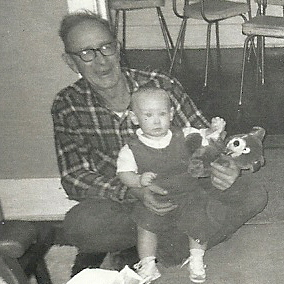
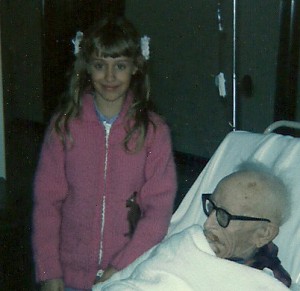
You may be curious about the relevance to Grandpa Knox, and indeed, there is a connection. Grandpa Knox once worked as a shepherd, and he had a greater imperative to protect his flock from predators. Unlike many shepherds who were alone, Grandpa was not. Accompanied by his wife, Nettie, and their three-year-old daughter, Joann Knox (Schulenberg), his first duty was their safety. While I cannot confirm any encounters where he wrestled with coyotes, mountain lions, or bears, it is conceivable that he had to scare some away using a gun or maybe just a loud voice.
Grandpa Knox never seemed to be the type to hunt or confront predators, yet I imagine he would have risen to the occasion if needed. The Grandpa Knox I knew when I became part of the family was more inclined towards 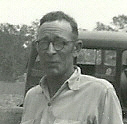
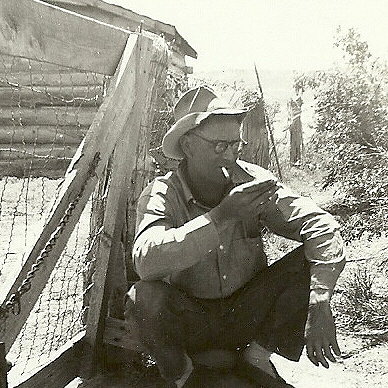 gardening. He devoted many summer hours to cultivating the garden at my in-laws’ place, which blessed our family with an abundance of wonderful vegetables. I used to think the most formidable predator he faced was perhaps a stray cow or a ravenous rabbit. Indeed, he dealt with those as well, but there was a time when he safeguarded his sheep from predators, reminiscent of the biblical shepherd tales. Today marks the 116th anniversary of Grandpa Knox’s birth. Wishing you a happy Heavenly birthday, Grandpa Knox. We love and miss you very much.
gardening. He devoted many summer hours to cultivating the garden at my in-laws’ place, which blessed our family with an abundance of wonderful vegetables. I used to think the most formidable predator he faced was perhaps a stray cow or a ravenous rabbit. Indeed, he dealt with those as well, but there was a time when he safeguarded his sheep from predators, reminiscent of the biblical shepherd tales. Today marks the 116th anniversary of Grandpa Knox’s birth. Wishing you a happy Heavenly birthday, Grandpa Knox. We love and miss you very much.
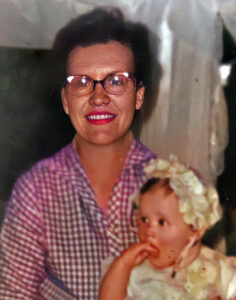
 Last Thursday brought the sad news that my aunt, Doris Spencer was leaving this earth. It was so hard to believe, mostly because she had lived her for a little over 100 years. So many people don’t get that opportunity, but Aunt Doris was very blessed. She had beaten the odds, to become a centenarian!! We were all so happy for her, and she was so happy. Her birthday celebration was such a wonderful event…worthy of her great accomplishment.
Last Thursday brought the sad news that my aunt, Doris Spencer was leaving this earth. It was so hard to believe, mostly because she had lived her for a little over 100 years. So many people don’t get that opportunity, but Aunt Doris was very blessed. She had beaten the odds, to become a centenarian!! We were all so happy for her, and she was so happy. Her birthday celebration was such a wonderful event…worthy of her great accomplishment.
The reality is that her whole life was lived as a blessing. I will never forget when we visited her. She always made everything so special. It didn’t matter what time we arrived; she would get up and make a meal. She always felt that a guest should have something to eat, and she was a wonderful cook, so we didn’t argue with her philosophy. We had so many wonderful visits through the years. I specifically remember the time we got to go and pick blueberries. Then we had cereal with fresh blueberries on it. Oh, my goodness!! So good!!


Aunt Doris’ life was blessed with children, grandchildren, and great grandchildren. Her family was the most important part of her life. She was blessed with long life and good health. For most of her years, she was able to get around largely on her own, even when she no longer drove, she could still maneuver and visit with family and friends. Aunt Doris liked people, and she enjoyed being with people. Now her life wasn’t perfect, and she has lost loved ones, but she knew she would see those who went before her, again, and now she is in Heaven with those who have gone before her.
Aunt Doris was the saving grace for my mother. When my mom, Collene Spencer and dad, Al Spencer got married and moved to Superior, Wisconsin, Aunt Doris and Uncle Bill rented the house behind their own to my 
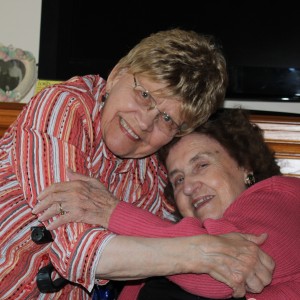 parents. The girls became best friends, and mom, who had never been away from her family before, felt like it would all be ok. She and Aunt Doris had so many “escapades” together, and they wouldn’t have traded a single one for anything different. Now, the girls are back together again in Heaven, and I’m sure they are having a wonderful time. I’m sure Aunt Doris is having a great time with all of her family and friends who have gone before her. We will miss Aunt Doris so much. She lived a wonderful, long life, and she was a blessing to all of us. Aunt Doris, we love you so much, and we can’t wait to see you again.
parents. The girls became best friends, and mom, who had never been away from her family before, felt like it would all be ok. She and Aunt Doris had so many “escapades” together, and they wouldn’t have traded a single one for anything different. Now, the girls are back together again in Heaven, and I’m sure they are having a wonderful time. I’m sure Aunt Doris is having a great time with all of her family and friends who have gone before her. We will miss Aunt Doris so much. She lived a wonderful, long life, and she was a blessing to all of us. Aunt Doris, we love you so much, and we can’t wait to see you again.

 When we see a structure like the Pontcysyllte Aquaduct in northeast Wales, we usually assume that it is simply a bridge or a railroad trestle, but in this case, we are very wrong. While the Pontcysyllte Aqueduct is navigable, it actually carries the Llangollen Canal across the River Dee in the Vale of Llangollen. I wondered why they needed an aqueduct to carry one river over another, but the truth is that the smaller river would be swallowed up by the larger, ending any possibility of the smaller river reaching the intended destination. The 18-arched stone and cast-iron aqueduct is designed for narrowboats and was completed in 1805 after a decade of planning and construction. Measuring 12 feet in width, it stands as the longest aqueduct in Great Britain and the tallest canal aqueduct in the world.
When we see a structure like the Pontcysyllte Aquaduct in northeast Wales, we usually assume that it is simply a bridge or a railroad trestle, but in this case, we are very wrong. While the Pontcysyllte Aqueduct is navigable, it actually carries the Llangollen Canal across the River Dee in the Vale of Llangollen. I wondered why they needed an aqueduct to carry one river over another, but the truth is that the smaller river would be swallowed up by the larger, ending any possibility of the smaller river reaching the intended destination. The 18-arched stone and cast-iron aqueduct is designed for narrowboats and was completed in 1805 after a decade of planning and construction. Measuring 12 feet in width, it stands as the longest aqueduct in Great Britain and the tallest canal aqueduct in the world.
Alongside the watercourse, there is a towpath on one side. “A towpath is a road or trail on the bank of a river, canal, or other inland waterway. The purpose of a towpath is to allow a land vehicle, beasts of burden, or a team of human pullers to tow a boat, often a barge. This mode of transport was common where sailing was impractical because of tunnels and bridges, unfavorable winds, or the narrowness of the channel.”
The Pontcysyllte Aqueduct was intended to be a central feature of the Ellesmere Canal, a proposed industrial waterway linking the River Severn at Shrewsbury with the Port of Liverpool on the River Mersey. Despite a cheaper route surveyed to the east, the chosen path traversed the Vale of Llangollen’s high ground to the west, passing through Northeast Wales’ coal-rich areas. The canal was only partially completed due to insufficient revenue generation for the entire project. Following the aqueduct’s partial completion in 1805, most significant construction stopped.
The aqueduct, designed by civil engineers Thomas Telford and William Jessop, was intended for a site near the 18th-century road crossing at Pont Cysyllte. Following the approval of the westerly high-ground route, the initial plan involved constructing a series of locks along both valley sides leading to an embankment that would  carry the Ellesmere Canal over the River Dee. However, once Telford joined the project, the design shifted to an aqueduct that would provide a direct and continuous waterway across the valley. Despite widespread public doubt, Telford remained confident in his construction approach, drawing on his experience from building the Longdon-on-Tern Aqueduct, a cast-iron trough aqueduct on the Shrewsbury Canal.
carry the Ellesmere Canal over the River Dee. However, once Telford joined the project, the design shifted to an aqueduct that would provide a direct and continuous waterway across the valley. Despite widespread public doubt, Telford remained confident in his construction approach, drawing on his experience from building the Longdon-on-Tern Aqueduct, a cast-iron trough aqueduct on the Shrewsbury Canal.
The Pontcysyllte aqueduct officially opened to traffic on 26 November 1805. A plaque commemorating its inauguration reads, “The nobility and gentry, the adjacent Counties having united their efforts with the great commercial interests of this country. In creating an intercourse and union between England and North Wales by a navigable communication of the three Rivers, Severn, Dee and Mersey for the mutual benefit of agriculture and trades, caused the first stone of this aqueduct of Pontcysyllte, to be laid on the 25th day of July MDCCXCV [1795]. When Richard Myddelton of Chirk, Esq, MP one of the original patrons of the Ellesmere Canal was Lord of this manor, and in the reign of our Sovereign George the Third. When the equity of the laws, and the security of property, promoted the general welfare of the nation. While the arts and sciences flourished by his patronage and the conduct of civil life was improved by his example.”
The bridge measures 336 yards in length, 12 feet in width, and has a depth of 5 feet 3 inches. It features a cast iron trough, which is supported 126 feet above the river by iron arched ribs resting on eighteen hollow masonry piers. Each of the bridge’s 18 spans measures 53 feet across. Following the aqueduct’s completion, the canal was intended to extend to Moss Valley, Wrexham, where Telford had built a feeder reservoir lake in 1796 to supply water for the canal stretch from Trevor Basin to Chester. However, the plan to construct this section was abandoned in 1798, which lead to the neglect, and eventual abandonment, of the feeder and a navigable stretch between Ffrwd and a basin in Summerhill. Traces of the feeder channel can still be seen in Gwersyllt, and a street in the village bears the name Heol Camlas, meaning ‘canal way’ in Welsh. John Simpson of Shrewsbury, who died in 1815, oversaw the physical construction.
With the project incomplete, Trevor Basin, located just beyond the Pontcysyllte Aqueduct, became the canal’s 
 northern terminus. By 1808, a feeder channel had been completed to transport water from the River Dee near Llangollen. To ensure a constant water supply, Telford constructed an artificial weir, known as the Horseshoe Falls, near Llantysilio to regulate the water level. The aqueduct is classified as a Grade I listed building and is a part of a UNESCO World Heritage Site.
northern terminus. By 1808, a feeder channel had been completed to transport water from the River Dee near Llangollen. To ensure a constant water supply, Telford constructed an artificial weir, known as the Horseshoe Falls, near Llantysilio to regulate the water level. The aqueduct is classified as a Grade I listed building and is a part of a UNESCO World Heritage Site.
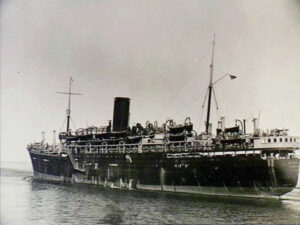
 The HMT Rohna, originally known as SS Rohna, was a passenger and cargo liner belonging to the British India Steam Navigation Company. Constructed in Tyneside in 1926, it was one of two new vessels ordered by the British India Line in 1925 for its Madras–Nagapatam–Singapore route. These sister ships had slight variations…being built at different shipyards with different engines. Hawthorn Leslie and Company constructed the Rohna in Hebburn on Tyneside, while Barclay, Curle and Company built the Rajula in Glasgow on Clydeside. The two ships were completed and launched around the same time in mid-1926.
The HMT Rohna, originally known as SS Rohna, was a passenger and cargo liner belonging to the British India Steam Navigation Company. Constructed in Tyneside in 1926, it was one of two new vessels ordered by the British India Line in 1925 for its Madras–Nagapatam–Singapore route. These sister ships had slight variations…being built at different shipyards with different engines. Hawthorn Leslie and Company constructed the Rohna in Hebburn on Tyneside, while Barclay, Curle and Company built the Rajula in Glasgow on Clydeside. The two ships were completed and launched around the same time in mid-1926.
The Rohna was launched on August 24, 1926, and her construction was completed by November 5. Named after a village in Sonipat, Punjab, India, she featured 15 corrugated furnaces heating five single-ended boilers, which together had a heating surface of 14,080 square feet. These boilers supplied steam at 215 lbf/in^2 (pounds per square inch) to two four-cylinder quadruple expansion steam engines, yielding a combined power of 984 Nominal Horsepower (NHP). Each engine propelled one of the ship’s twin screws, enabling the Rohna to achieve 984 NHP or 5,000 Indicated Horsepower (IHP). On her sea trials, she reached 14.3 knots (2, with a cruising speed of 12.5 knots). By 1934, the Rohna was equipped with wireless direction-finding equipment.
As the United Kingdom entered the World War II in September 1939, the Rohna was navigating the Indian Ocean. Other than a journey from Karachi to Suez with Convoy K 4, the Rohna sailed unescorted between Rangoon and Madras until the end of November. Departing Bombay on December 10th, she headed for the Mediterranean, transited the Suez Canal on December 20-21, and arrived in Marseille on December 26th. From January 3, 1940, to March 10th, she moved unescorted between Marseille and the Port of Haifa in Mandatory Palestine, initially as part of convoys but later, after January 29th, on her own.
On March 15, 1940, the Rohna sailed back through the Suez Canal to the Indian Ocean, where she operated unescorted between Bombay, Rangoon, and Colombo until June. In May, she was requisitioned as a troop ship, and on June 6th, she departed from Bombay to Durban. She continued to operate between Durban, Mombasa, and Dar es Salaam until July 28th, when she embarked from Mombasa to return to Bombay.
The Rohna transported troops from Bombay to Suez in August 1940 with Convoy BN 3, and from Bombay to Port Sudan in September/October 1940 with Convoy BN 6. Subsequent journeys included Bombay to Suez in November 1940 with Convoy BN 8A, Colombo to Suez in February 1941 with Convoy US 8/1, and Bombay to Singapore in March 1941 with Convoy BM 4. Following the Iraqi coup d’état in April 1941, the Rohna was directed to Karachi, from where she transported early units of Iraqforce to Basra in Convoy BP 2. During the Anglo-Iraqi War in May, she completed a second voyage from Karachi to Basra with Convoy BP 5. After the Allied triumph in Iraq at May’s end, she continued shuttling between Basra and Bombay, departing to Basra with BP-series convoys and returning independently.
On December 8, 1941, Japan invaded Malaya. The following month, Rohna departed Bombay for Singapore with Convoy BM 10, arriving on January 25, 1942. She set sail on January 28 in Convoy NB 1, two weeks before Singapore fell to Japan. From March 1942, Rohna spent a year navigating the Indian Ocean, visiting Bombay, Karachi, Colombo, Basra, Aden, Suez, Khorramshahr, Bandar Abbas, Bahrain, and Abadan, sometimes as part of convoys, often unescorted. In March 1943, she embarked from Bombay with Convoy BA 40 to Aden, then proceeded independently to Suez, passing through the canal on April 6–7.
Throughout the rest of her service, Rohna was instrumental in supporting the North African Campaign, as well as the Allied invasions of Sicily and Italy. Until early July, she operated independently, navigating between Alexandria, Tripoli, and Sfax. She primarily joined convoys, plying the routes between Alexandria, 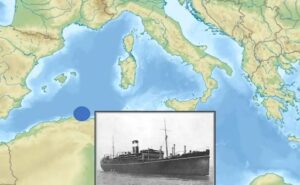
 Malta, Tripoli, Augusta, Port Said, Bizerte, and Oran.
Malta, Tripoli, Augusta, Port Said, Bizerte, and Oran.
Her requisition as a troop carrier in 1940, at the onset of World War II, placed a target of sorts on her back, and in November 1943, the Rohna was sunk in the Mediterranean by a Henschel HS 293 guided glide bomb launched from a Luftwaffe aircraft. The attack resulted in the deaths of over 1,100 individuals, the majority being United States troops.

